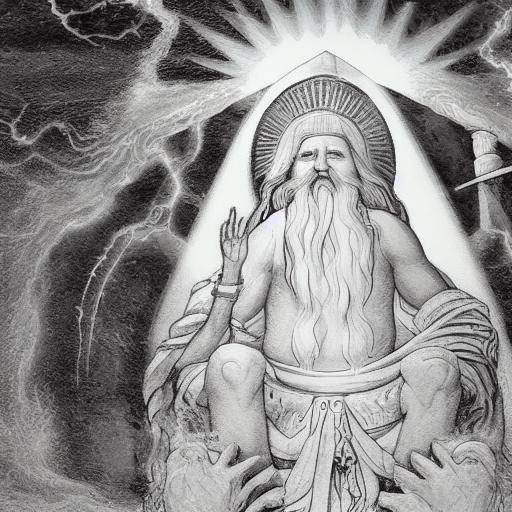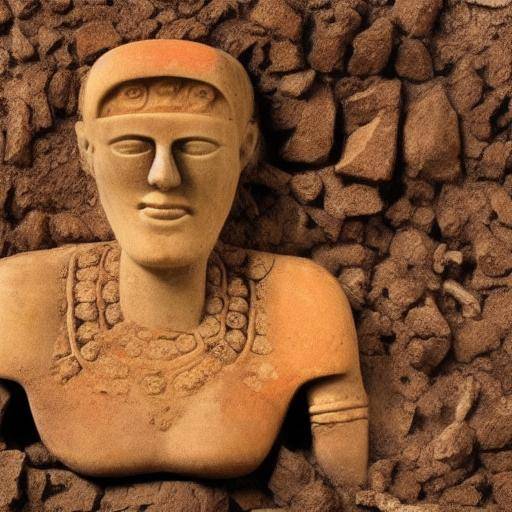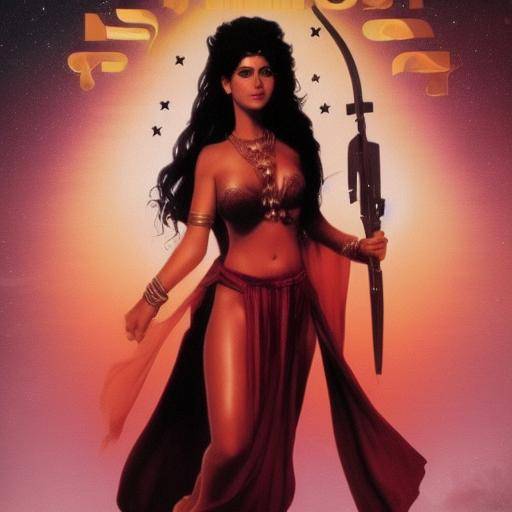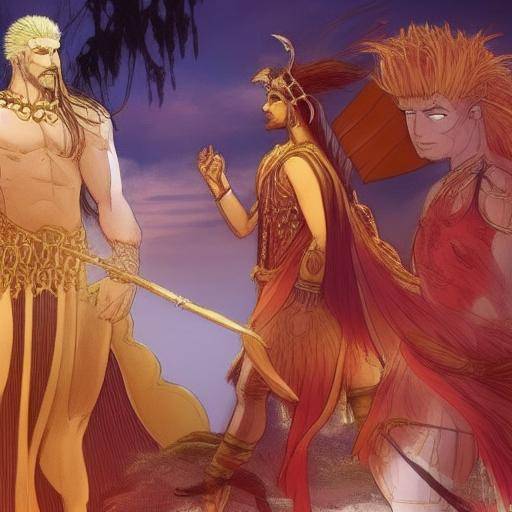
In Mesopotamian mythology, Enki is widely known as the god of water, wisdom, craftsmanship, and a powerful defender of humanity. His influence goes beyond being a deity, as his legacy transcends through myths and legends, leaving a lasting mark on Mesopotamian culture. In this extensive analysis, we will explore in detail the Enki figure, getting into the Mesopotamian myths, and unraveling its importance as a god of water.
Introduction
The ancient civilizations of Mesopotamia worshiped Enki as a primordial deity, whose role was essential to the existence and development of life. Through this article, we will unravel not only the beliefs and myths associated with Enki, but also its influence on Mesopotamian mythology and its relevance as a god of water and wisdom. We will explore the rich narratives surrounding Enki, deepening its legacy and its impact on various facets of Mesopotamian culture.
Origins and Historical Context
Mesopotamian myths are a treasure of knowledge and belief rooted in the ancient civilizations of the region. In this context, Enki emerges as one of the most prominent deities, embodying the vital importance of water in the societies of that time. His connection with wisdom and craftsmanship is intertwined with his role as the protector of humanity, consolidating his position as a fundamental divine figure in the beliefs and practices of Mesopotamian mythology.
Importance of Enki in Mesopotamian Mythology
Enki not only embodies the essence of water and wisdom; his character represents the balance between order and chaos, a duality that permeates the mesopotamian worldview. In addition, through his exploits and actions, Enki becomes a paradigm of divine behavior and benevolence, inspiring reverence and respect for those who seek his favor and protection.
Detailed Analysis of Enki and its Role as God of Water
Enki's presence as a water god goes beyond his mere dominion over this vital element. Its influence encompasses land fertility, crop growth, and the general well-being of mankind. In this sense, Mesopotamian mythology reveals Enki's transcendence as a god who gives life and livelihood through water, nourishing the earth and fostering prosperity.
Legends and Narratives Associated with Enki
The narratives surrounding Enki are as fascinating as they are varied, approaching from their cunning artifacts to safeguard humanity to their clashes with other deities in order to preserve the cosmic order. These legends offer a profound view of the complexity of Mesopotamian beliefs, as well as the multifaceted nature of Enki as a god of water and wisdom.
Enki and the Cultural Development of Mesopotamia
Devotion to Enki is also reflected in the intersection between mythology and everyday life in Mesopotamia. The construction of irrigation channels and systems, vital to the survival of the communities, were regarded as earthly manifestations of Enki's beneficial power. This connection between the divine and the earthly gave Enki a lasting influence on the development and very structure of Mesopotamian societies.
Comparison between Enki, Mesopotamian Myths and the God of Water Concept
Enki's relevance as a god of water and wisdom, as well as his role in Mesopotamian myths, provides a fascinating point of comparison with other belief systems. When examining the similarities and differences with divinities and mythologies of other cultures, the singularity and complej are glimpsed"And a potential harmonious integration of shared themes across diverse civilizations. "
Practical Tips and Accessible Recommendations
For those interested in further exploring the Enki figure, as well as Mesopotamian myths and the concept of the water god, here are some practical tips and actionable recommendations:
- Dive into academic literature and primary sources that address Mesopotamian mythology, specifically seeking references to Enki and its influence.
- Participate in cultural events or exhibitions that address the wealth of Mesopotamian mythology, allowing you to experience first-hand artistic and cultural expressions inspired by Enki and other Mesopotamian divinities.
- Explore the connection between Mesopotamian myths and the social and political structures of the former Mesopotamia, identifying how Enki's influence transcended the spiritual to impact people's daily lives.
- Interact with communities and experts in Mesopotamian mythology and water gods in online forums or specialized events, sharing knowledge and perspectives about Enki and her legacy.
Conclusions and Frequently Asked Questions about Enki, Mesopotamian Myths and the God of Water
Conclusions
In conclusion, Enki, the god of water and wisdom in Mesopotamian mythology, is erected as a central figure whose influence covered vital aspects for the existence and well-being of the ancient civilizations of Mesopotamia. His legacy endures through Mesopotamian myths, generating an immeasurable cultural wealth that transcends time and space. The depth of his symbolism as a god of water and wisdom reflects the profound understanding that Mesopotamian societies had of the vital importance of the aquatic element and divine wisdom in their lives.
Frequently asked questions
What is the importance of Enki in Mesopotamian mythology?
Enki plays a vital role in Mesopotamian mythology as a god of water, wisdom and craftsmanship. Its influence extends to the protection of humanity and the promotion of fertility and prosperity through the aquatic element.
How does Enki connect with Mesopotamia's cultural development?
The connection between Enki and the cultural development of Mesopotamia lies in its influence in the construction of irrigation systems and channels, which are extremely significant for the survival and prosperity of the communities.
What are some outstanding legends associated with Enki?
Legends associated with Enki range from their cunning to save humanity to their clashes with other deities in order to maintain the cosmic balance. These narratives offer a profound view of their role as a god of water and wisdom.
What is the relationship between Enki and other water-related deities in different cultures?
The Enki figure shares thematic similarities with divinities associated with water in other cultures, suggesting the presence of certain universal archetypes in beliefs about the aquatic element and its influence on human life.
In what practical aspects is the influence of Enki in the daily lives of people in the former Mesopotamia?
Enki's influence is reflected in practical aspects such as agriculture, architecture and navigation, where his power as a god of water sponsored the prosperity and well-being of Mesopotamian communities.
How has Enki's influence on contemporary culture persisted?
Enki's influence on contemporary culture is manifested through the perpetuation of mesopotamian myths and the continuing academic and artistic exploration of his figure, which validates its lasting relevance in the cultural and academic sphere.
In this extensive analysis, we have explored the fascinating nuances of Enki, the God of Water and Wisdom in Mesopotamian mythology. His legacy endures as a timeless reminder of the intimate bond between divinity, the aquatic element and the flourishing of life in the rich and prosperous land of Mesopotamia.






